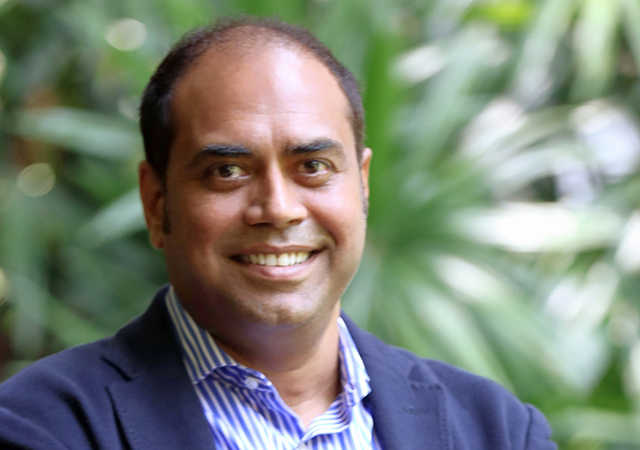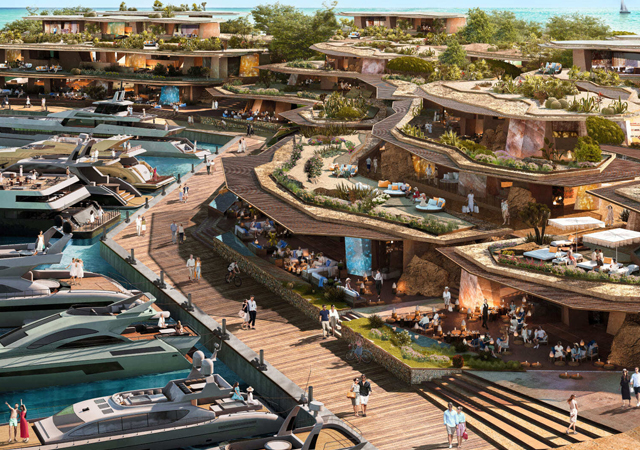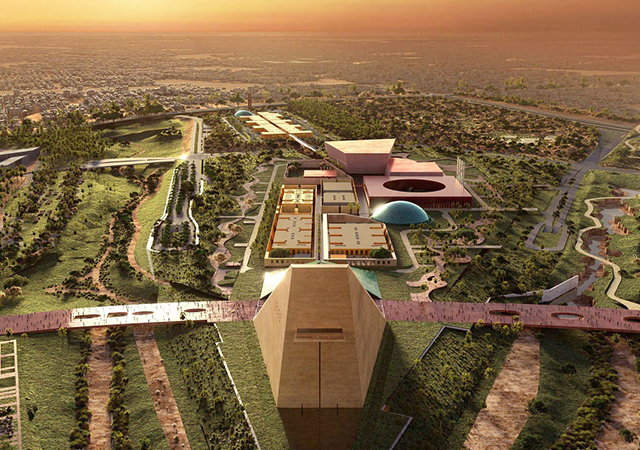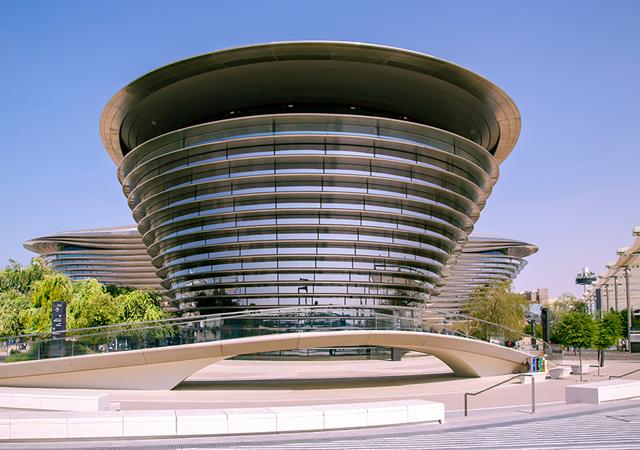Technal well-placed to cater to mega projects
01 May 2024
Hydro Building Systems Middle East (Technal), a leading provider of architectural aluminium building systems, sees huge growth potential in the Saudi Arabian market which is driven by the country’s ambitious Vision 2030 plan. This strategic roadmap emphasises economic diversification beyond oil, boosting tourism, and hosting mega-events like Expo 2030 and the 2034 FIFA World Cup, which is expected to significantly increase demand for innovative and sustainable infrastructure solutions.
Technal boasts a strong track record in the region, having successfully delivered projects for Dubai’s Expo 2020 and Qatar’s World Cup. Leveraging this deep technical experience, the company says it is well-positioned to meet Saudi Arabia’s expanding infrastructure needs. Its focus on delivering fast and high-performing construction solutions aligns directly with the demands of the rapidly growing Saudi market.
Technal specialises in local supply of international aluminium building systems, significantly contributing to the in-country value, and supporting the ‘Saudi Made’ initiative in the kingdom. In Saudi Arabia, the company today caters to various sectors, from luxury hotels to complex facades and high-rise buildings.
Speaking about Technal’s current projects in Saudi Arabia in an exclusive interview with Gulf Construction, the company’s Vice President for the Middle East, Asia, Africa & Americas Robinson Sam says: “Technal is actively involved in several high-profile construction projects across Saudi Arabia, each known for its scale and complexity. These include projects at Sindalah Island in the futuristic Neom city and King Salman Park in Riyadh, among others.
“The Sindalah Island project began in early 2021 and is projected to be completed by late 2025. Work on King Salman Park, designed to be one of the world’s largest urban parks, started in late 2020 and is set to finish by mid-2024.
 |
|
Sam ... actively involved in high-profile projects across Saudi Arabia. |
“Each project has its unique demands and challenges. For instance, Sindalah Island requires the integration of smart city technologies and sustainable building practices, pushing the company to innovate in terms of materials and construction techniques. Neom’s broader scope calls for scalable solutions that can adapt to evolving architectural designs. King Salman Park focuses on environmental sustainability and aims to enhance Riyadh’s green footprint, requiring the company to meet stringent environmental standards.”
“The primary challenges across these projects include managing the supply chain for high-quality materials, adhering to strict timelines, and ensuring that all construction practices meet the futuristic and sustainable vision these projects embody. Additionally, the need to coordinate with multiple stakeholders and adapt to on-the-ground changes adds layers of complexity to the execution of these orders,” Sam points out.
Over the past year, Technal has been involved in several complex and interesting projects in the region, showcasing innovative construction methodologies and collaboration with leading technology firms. Notable among them are the Wasl Tower in Dubai (UAE) and Lusail Plaza in Lusail city (Qatar), apart from the Sindalah Island project in Neom.
“Wasl Tower in Dubai is an architectural marvel designed with an integrated ceramic facade that twists as it rises. It stands out due to its unique design and use of dynamic lighting, which creates a distinctive visual signature on the city’s skyline. Together with our metal builder partner Technical Glass & Aluminium, we executed this project in record time,” he explains.
 |
|
Technal employed innovative systems at Sindalah Island. |
Lusail Plaza comprises four towers that are set to become iconic features of the cityscape. Together with the company’s metal builder partner Alutec, which employed Design for Manufacturing and Assembly (DFMA) techniques, Technal was able to execute the four towers with complex cold bending with integrated shading fins, according to Sam.
“This project highlights the company’s capacity to handle large-scale developments that involve complex structural and aesthetic elements. Moreover, the project demanded the supply of more than 5,000 MT of aluminium during the Covid pandemic, which serves to prove the incredible supply chain capability of Technal,” he remarks.
Technal offers a range of services to the construction industry, including designing, manufacturing, and supplying premium, sustainable, energy-efficient architectural aluminium systems for windows, doors, facades, skylights and pergolas under its international brand Technal. Furthermore, the company has a dedicated pre-construction service department to support architects and investors by providing design assistance and selecting regionally suitable solutions that comply with the new Saudi building codes and international quality standards.
Sam is confident of Technal’s continued success in the coming years, given its track record over the past 45 years in the Middle East that has positioned it as a reputable and reliable solution provider for architectural aluminium systems.
Commenting on business prospects, he says: “Over the past year, the opportunities for the business have been growing compared to yesteryear.”
Technal plans to grow its business through several strategic initiatives aimed at enhancing its operational capacity and market presence. Key among these plans is the expansion of its team, which will involve recruiting additional skilled professionals to support its increasing scope of projects and to bolster its expertise in sustainable construction practices, Sam says.
 |
|
King Salman Park project required Technal to meet stringent environmental standards. |
Additionally, Technal aims to expand its reach by increasing its on-field support and growing its market presence in the kingdom. This expansion will be complemented by a stronger focus on sustainability and promoting low-carbon solutions. By pushing forward these eco-friendly initiatives, the company intends to meet the growing demand for sustainable building practices and establish itself as a leader in the decarbonisation movement.
Over the past year, Technal has undertaken several key developments to align with global sustainability trends and local strategic goals, such as Saudi Vision 2030 and Saudi Green Initiatives. Among them is the introduction of Circal, an innovative aluminium alloy that significantly enhances the sustainability profile of the company’s offerings.
“Circal is made up of at least 75 per cent recycled post-consumer aluminium scrap, and its adoption in Technal systems has helped to avoid 1.5 million tons of embodied CO2 emissions in more than 500 projects,” he stresses.
Additionally, Technal has expanded its services and presence on the ground to more comprehensively support the construction industry: It has set up a dedicated 60,000-sq-ft warehouse in Bahrain and opened two Technal experience centres in Dubai and Bahrain.
On the products side, Technal has a wide range of luxury offerings to satisfy the growing demand for large, super-Jumbo panels up to 6 m height and more. In addition, through Circal, Technal not only responds to the demand for low-carbon and energy-efficient windows, doors and facades, but also positions the company as a leader in sustainable building practices. These developments represent both a vertical and horizontal expansion of the company’s capabilities and demonstrate its commitment to innovation and sustainability in the construction sector, Sam adds.
“Technal is not just about windows, doors and facades. We are about building a sustainable future by demonstrating our commitment to innovation, decarbonisation and delivering outstanding buildings,” Sam emphasises.
Leveraging its regional headquarters in Riyadh and network of authorised metal builders in the kingdom, Technal aims to deliver top-tier sustainable solutions. This integrated approach positions Technal as a strong partner for Saudi Arabia’s infrastructure transformation, ensuring projects meet national sustainability targets and market demands.
- Technal well-placed to cater to mega projects
- Digital tools can cut fuel consumption, emissions
- Sanipex success built on quality, designs
- Actros L’s ProCabin set to impress operators
- Geberit boosts Bambini’s child-friendly appeal



